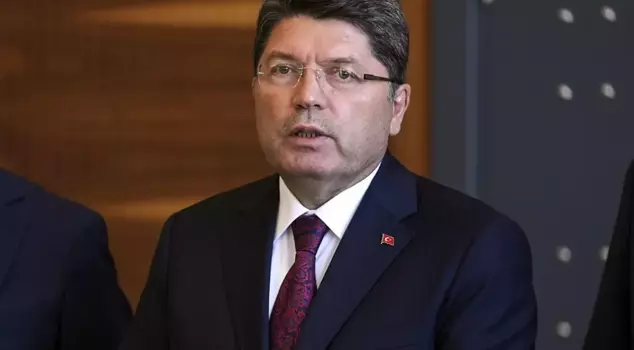
01.09.2025 23:14
The Minister of Justice, Yılmaz Tunç, made a statement regarding the claims of a potential amnesty regulation. Minister Tunç stated, "We do not have any regulations that imply amnesty."
The Minister of Justice, Yılmaz Tunç, stated in his announcement, "We have no regulations that mean amnesty."
CLAIM OF "AMNESTY REGULATION"
While work continues on the new judicial package, the details have become a matter of curiosity. After the opening of the Grand National Assembly of Turkey (TBMM), the package is expected to come to the General Assembly, and it has also been claimed that there will be an amnesty regulation for prisoners in its content.
MINISTER TUNÇ: WE HAVE NO REGULATIONS THAT MEAN AMNESTY
A clear statement came from the Minister of Justice, Yılmaz Tunç, regarding the issue. Minister Tunç used the expressions, "We have no regulations that mean amnesty."
“THERE ARE STUDIES RELATED TO THE 11TH JUDICIAL PACKAGE”
Minister Tunç stated, "The issue mentioned by our Supreme Court President was discussed regarding execution regulations. From time to time, proposals for changes to the execution law have been discussed in the parliament and have become law. There are demands and issues that are requested to be brought to the agenda. There are regulations. Expansive regulations regarding execution in cases of illness have been made. To eliminate the perception of impunity related to supervised release, regardless of how much punishment is received, the regulation aimed at imprisonment was enacted in the 10th Judicial Package. There are studies related to the 11th Judicial Package. Currently, draft studies are ongoing. These are matters that are at the discretion of our parliament. In line with the demands from our citizens in practice, we provide technical support. In this sense, we are working with certain professions within the framework of preparations for the 11th Judicial Package."
“THE AIM OF THE CRIMINAL JUSTICE SYSTEM IS TO PROTECT SOCIETY”
Expressing that the criminal system consists of 3 stages, Minister Tunç continued his words as follows: "The investigation stage, the stage of collecting evidence in a healthy manner effectively, the 2nd stage is the prosecution stage; here, the trial must be conducted in a healthy manner based on the evidence collected. The 3rd stage is the execution stage; this stage is as important as the investigation and prosecution stages of the criminal justice system. This stage must particularly serve the purpose of criminal justice. So what is the aim of criminal justice? The aim of the criminal justice system is to protect society.
To prevent the commission of crimes and to apply the necessary sanctions to the person when a crime is committed, and while applying the sanction, to rehabilitate and reintegrate them into society. Therefore, the stage of reintegrating the criminal execution into society and the rehabilitation stage is the stage of applying the sanction in accordance with human rights. For this reason, in the criminal execution law, which is officially called the law on penalties and security measures, significant changes have been made within the framework of judicial packages. The criminal execution law was completely renewed in 2025. Within the scope of this renewal, especially different procedures were determined. Here, especially the release periods for terrorist crimes, sexual crimes, and drug crimes were legally applied. In other crimes, there were also applications in the form of 2/3.
Subsequently, based on the evaluations of our parliament, a comprehensive change was made in the execution law during the 27th legislative period. The execution procedures for general crimes were determined in the form of ½, and conditional release remained for sexual crimes, drug crimes, and terrorism. Conditional release periods were determined. The duration of supervised release has been set at 1 year. In the 10th judicial package, we maintained this fixed period as 1 year. However, we also introduced a certain ratio. For crimes under 1 year, the perception of impunity caused by not spending any time in prison led us to make a new regulation to prevent that."